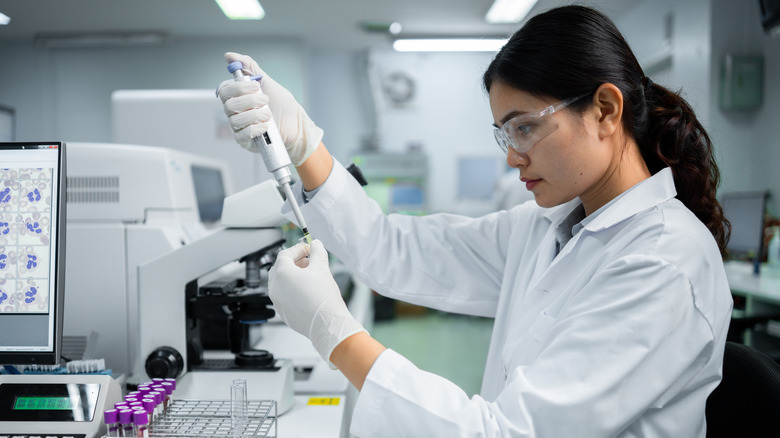Cancers That Can Be Detected Through Genetic Testing, According To A Doctor
Genetic testing looks at your cells and tissues to look for any changes in your genes, chromosomes, or proteins in your DNA. Genetic testing can be useful in seeing if you're at greater risk for certain diseases, but it can also look at the progression or severity of a disease. Finding out your risk of disease can help you make better decisions about your health while avoiding unnecessary checkups and screenings if you're at a lower risk for diseases. Although genetic testing can be helpful, it's often expensive. Further, insurance often doesn't cover it unless a family member has a certain disease, such as cancer (via MedlinePlus).
Chadi Nabhan, M.D., is a medical oncologist and author of "Toxic Exposure: The True Story Behind The Monsanto Trials and The Search For Justice." In an exclusive interview with Health Digest, Nabhan says that genetic testing isn't ordered for everyone. "The question of genetic testing is complex because there are nuances," Nabhan said. "For example, random people don't just go and do genetic testing, but tests happen in families with a higher risk of having cancer because a relative was diagnosed with cancer and the doctors thought it was potentially genetically inherited."
Genetic tests can detect cancers of the breast, colon, pancreas, and thyroid, according to the American Society of Clinical Oncology. Inherited gene mutations are also linked to relatively rare cancers, such as sarcoma and ovarian cancer.
Genetic testing can determine risk of cancers
According to BreastCancer.org, just 1 out of 500 women carry the BRCA1 and BRCA2 gene mutation that can increase your risk of developing breast cancer. It should be noted that everyone has the BRCA1 and BRCA2 genes that suppress tumors. Your cancer risk increases when one of these genes stops functioning correctly. Nabhan says your doctor will order a genetic test for you if a genetic mutation is suspected.
Lynch syndrome occurs when an inherited gene mutation from one parent affects the normal gene, according to the Centers for Disease Control and Prevention (CDC). When these genes work normally, they protect you from cancer. When they don't work the way they should, your risk for cancer increases. Although Lynch syndrome accounts for most hereditary colon cancer cases, it also puts you at risk for cancers of the stomach, liver, kidney, or brain.
A mutation in the TP53 tumor suppressor gene causes Li-Fraumeni syndrome (LFS). "When that happens, people are at increased risk of developing certain cancers such as breast cancer and soft tissue sarcoma," Nabhan said. According to the National Institutes of Health, LFS is relatively rare, affecting less than 50,000 people in the United States.
Genetic testing isn't a guarantee
According to the American Society of Clinical Oncology, a genetic test doesn't mean you'll get cancer — but only whether or not you're more at risk for certain cancers. If your genetic test says you don't have an inherited gene mutation for a particular cancer, it doesn't mean you won't get cancer. Your lifestyle, environmental factors, and medical background could put you at greater or reduced risk for cancer.
"Most cancers are sporadic and not inherited," Nabhan said. "In general, I estimate that anywhere from 5% to 15% of cancers can occur because of an inherited mutation that has passed from one generation to another." BreastCancer.org says 5% to 10% of breast cancers are a result of these genetic mutations. In other words, there are other factors that can result in developing breast cancer — aside from a genetic mutation.
The American Cancer Society says that genetic testing isn't always needed, even if you do have cancer. However, it might provide some benefit if you or someone in your family developed cancer at an early age.



